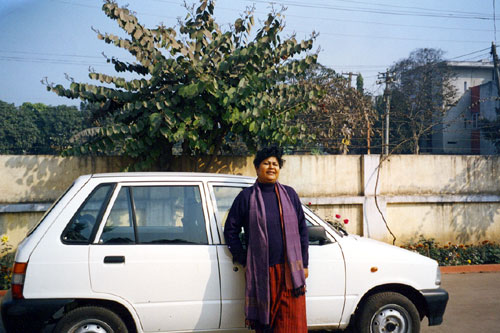Jug Suraiya,
24 December 2006, Times Of India, New Delhi.
I was in two minds about writing this column. I still am. The thought of writing it first came to me when I read of the brutal murder of Papiya Ghosh, the noted academic and historian, in Patna. No, this is not a memorial to Papiya. I never met her, nor can I claim to be acquainted with her work. A tribute from me would be a presumption. However, I did have a connection over many years with Papiya and her sister, Tuktuk, who is now a senior civil service officer.
Papiya and Tuktuk were by far the most regular contributors to Kookie Kol — a sort of zany Letters to the Editor column — in the Junior Statesman (later renamed JS) magazine. It was said of JS that it helped to invent the Indian teenager. I don’t know about that but it did provide a platform for young people from all over the country to interact both with each other and with the JS staffers, who in most cases were not much older than their reader-correspondents. If 30 years after its closure JS is still so vividly recalled by the generation which grew up with — and partly through — it, it is because the magazine was not so much a publication as a participatory rite of passage.
People still talk about the ‘Love is’ posters that featured in JS, and the large serialised pin-ups, particularly those of the comic strip heroine Modesty Blaise and Zeenat Aman. And all JS readers-writers remember Papiya and Tuktuk who almost every week traded deft and daft witticisms with Kookie in his column. Much of the humour of Kookie Kol centred round the near-mythical PM (no, not Prime Minister but Prize Money) that the deliberately niggardly Kookie doled out only on the rarest occasion. The PM was only 25 rupees, not a large sum even in those far-off, pre-inflation days. Nonetheless, the PM became an avidly sought after Golden Fleece which, week after week, inspired intrepid expeditions into the realm of spoof and satire. And many of the more successful sallies were by Papiya and Tuktuk.
Of all the greater family JS, I was perhaps the most grateful for the persistence of the duo. For, while the bespectacled sketch that adorned the top of Kookie Kol was of my colleague Dubby Bhagat, the operative Kookie who handled the column was me (a piece of JS trivia revealed here for the first time) and without Papiya and Tuktuk’s energetic correspondence, I doubt if I’d have been able to sustain the slot. Before her life was so viciously cut short, Papiya went on to earn honours far more esteemable than Kookie’s paltry PM. But I, and perhaps a lot of others, will remember her at least partly for her long-ago weekly forays into a long-lost world of innocence and humour. And this is why I was in two minds about this column, still am. For it’s a column, as I’ve said, not so much about Papiya and the terrible end she met, as about the business of laughter and remembering. Is it an insensitive frivolity, a tasteless desecration, to counter the dread solemnity of death — particularly when untimely and violent — with the memory of mirth?
Mercifully, the mind can’t long harbour pain. Memory is a creative act of anaesthetic amnesia. Most of us tend to remember selectively, overlaying the traumas of the past with recollections of the good and the pleasant. There is an inevitable measure of guilt in this partial and necessary interment of memory. It helps to ask ourselves if, far from being a callous escape, laughter finally is the best remembrance. Our only chance of literally having the last laugh — or indeed perhaps the first as well — on our common mortality. Perhaps remembered laughter is the real Prize Money beyond any other. And come to think of it, maybe I’m not in two minds about this column any more.








